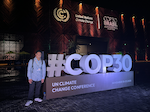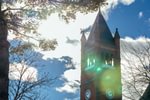
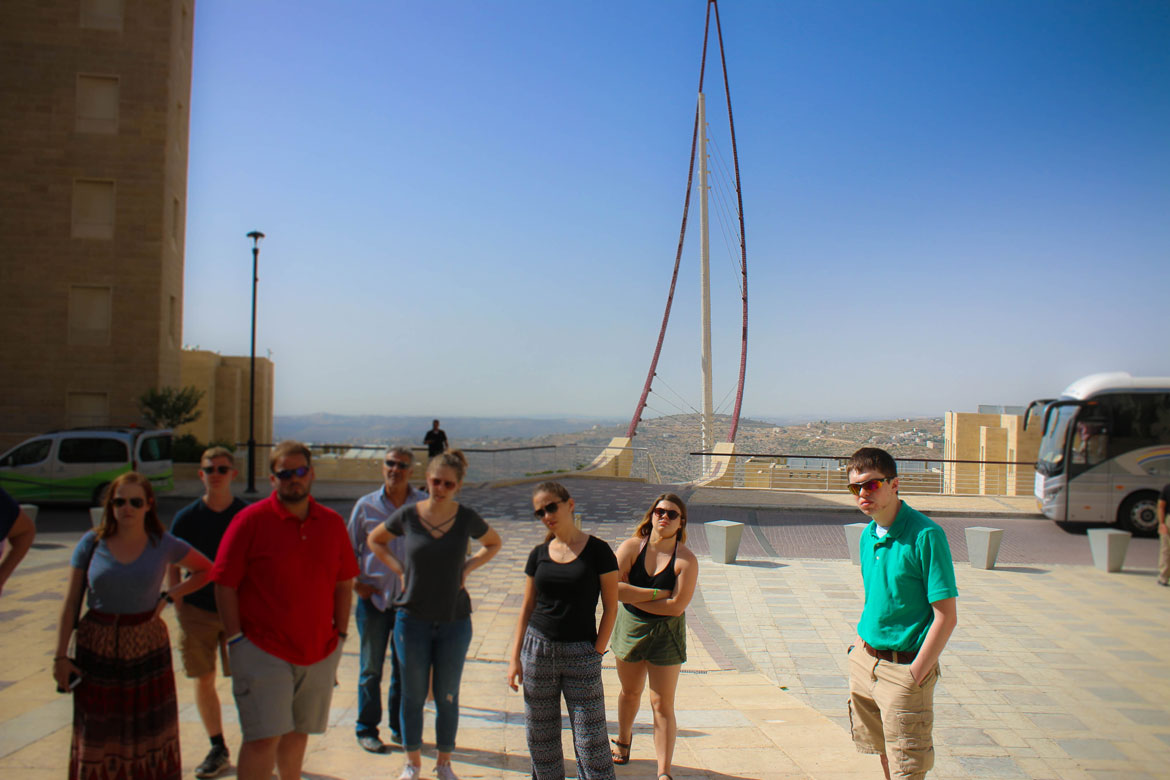
As I peered out of Ben Gurion Airport in Tel Aviv, Israel, I was not entirely sure what to expect. After all, just about every image of the Middle East I had seen was punctuated with images of blood and flames and accented with sounds of gunfire and sirens. Yet, there was an odd sense of calm as we boarded the bus that would carry us throughout Israel and the Palestinian territories over the next 10 days as part of the Eisenhower Institute's Inside the Middle East program, an expert program led by Salisbury Fellow of Intelligence and Middle East Affairs Avi Melamed.
In retrospect, I should have known that the constant images of graphic violence could not possibly represent an accurate depiction of the reality on the ground; after all, the Middle East region is home to more than 200 million people who live fairly normal lives. As the trip progressed, we would meet with students, policy-makers, and analysts as we worked to understand the arsenal of challenges—acute economic and infrastructural maladies to burgeoning religious and political extremism—that this region faces.
We saw many of those challenges first hand. At the very first place we stopped, the Tsofim Observation Point, we could see into an Israeli settlement in the West Bank, the Palestinian city of Qalqilya, and much of the Israeli coastline. This was the first of several points on the trip where we saw the varying narratives of the Middle East literally collide. The next evening, we heard from four Jerusalemites, both Palestinians and Israelis, on their connection to the city. What was striking about the dialogue was the level of nuance that each panelist brought to the conversation; western media portrayals of the Israeli-Palestinian conflict tend to squeeze out moderate voices and focus predominantly on waves of violence. Furthermore, panelists emphasized that dialogue offered the best hope for a path forward that might eventually lead to the easing of tensions on each side of the conflict, and that, while international involvement is needed in ongoing negotiations, too often foreign heads of state want to be involved only to the extent that they want to be "the guy" who "solved" Middle East peace for once and for all. The fruits of such an approach are evident in western policy towards the Middle East over the last several decades: systematic failure.
Later in the trip, we traveled into the Palestinian territories in the West Bank and met with a Palestinian professor who has advised political leaders on both sides of the conflict for decades. Each side fails to see that the other is composed of humans, he said. He cited anecdotes of Israeli Jewish children chanting "Death to Arabs!" and of Palestinian Muslim children chanting "Death to Jews!" He believes this hate is taught and incubated in schools, and, now in the twilight of his career, he would like to start a kindergarten to shape the next generation of Arab-Israeli interactions from the ground level.
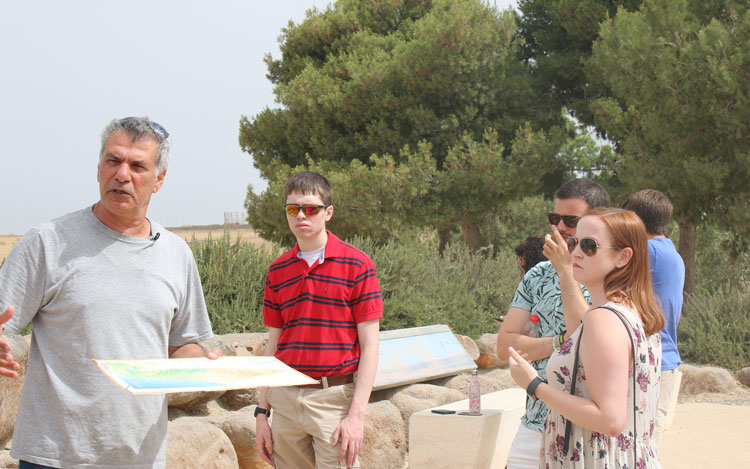
Hearing voices from such a diversity of perspectives and backgrounds throughout the trip and experiencing for myself just how close everything is geographically—Israel is about the size of New Jersey, and, over the course of just four days, we stood at Nahal Oz and peered into Gaza, entered Ramallah and met with Palestinians, drove along the Jordanian border and looked across the River Jordan, stopped in the Golan Heights and looked into Syria, and ascended a hill to the Kibbutz Misgav Am observatory to gaze deep into Lebanon—the multidimensional complexity of the region we spent so much time dissecting on the Gettysburg campus came to life.
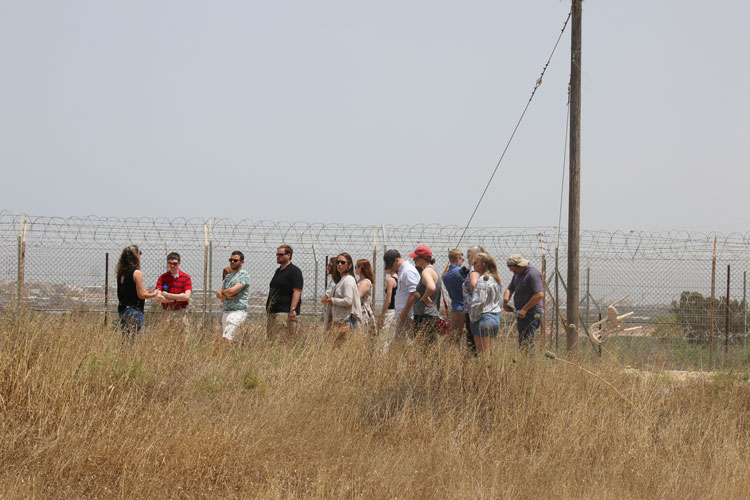
Visiting Nahal Oz, a kibbutz near the Gaza border.
It was the essence of experiential learning; only so much can be accomplished in the classroom. We are extremely fortunate that donors believe in the value of providing these on-the-ground experiences. Where one might be lucky to hear one or two aspects of an issue affecting the Middle East in the United States, on the ground, we heard three, four, five, or ten factors that overlapped, intertwined, and collided. I had always considered myself to be fairly informed on issues of the region, but Inside the Middle East has transformed my outlook and helped me begin to know how much I don't know, which has inspired a desire to keep learning.
This program has been a paradigmatic shift from any educational experience I have had before. Avi threw us into the deep end, where one could easily drown from the deluge of sources, buzzwords, and narratives we encountered, and then taught us how to swim by wading through all of the information as we began to understand what is actually happening on the ground. Someone once asked me whether Avi and the ITME program has a political agenda; the truth is that Avi's only bias is towards reality. From day one, we were challenged to interrogate our preconceived ideas, to analyze an issue from a different angle, and to synthesize everything that we gather as we worked to use the intelligence we had gathered to make a prediction at the end of our intelligence bulletins and reports that would, in Avi's words, meet the test of reality. Knowing that you have to go on the record to make a prediction leaves nowhere to hide faulty logic, missing information, or poor reasoning. That attention to detail and mandate of excellence will surely serve all of us well as we pursue our respective paths in government, politics, graduate school, law school, or the private sector.
Next year marks 50 years since the death of President Eisenhower, and I recently re-read his 1961 farewell address. In it, he said, "During the long lane of the history yet to be written, America knows that this world of ours, ever growing smaller, must avoid becoming a community of dreadful fear and hate, and be, instead, a proud confederation of mutual trust and respect." Inside the Middle East honors President Eisenhower's legacy by working to build that confederation of mutual trust and respect through the sense of informed citizenship and civic engagement that this program cultivates. Our world certainly needs it.
Ben Pontz ’20 is a political science and public policy double major and a music minor.

